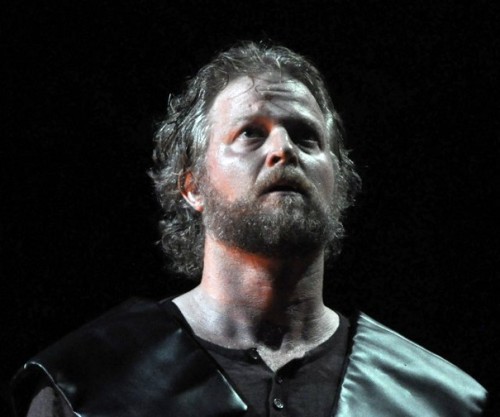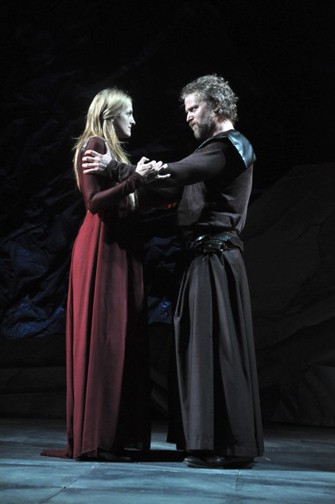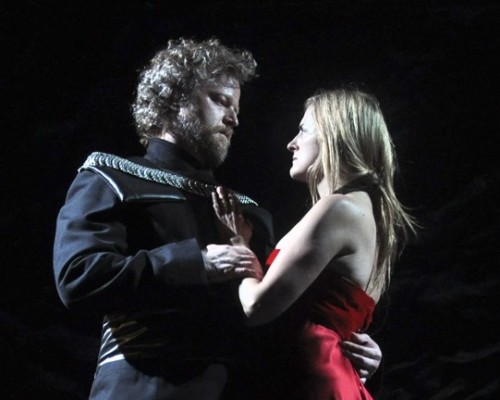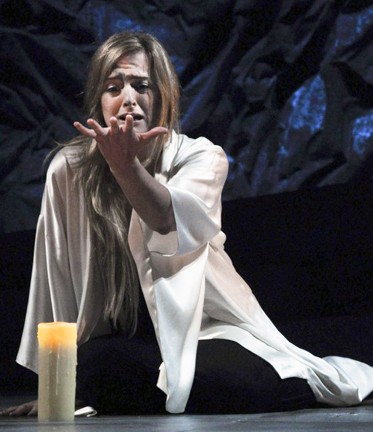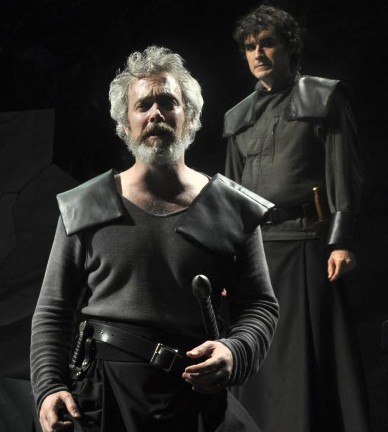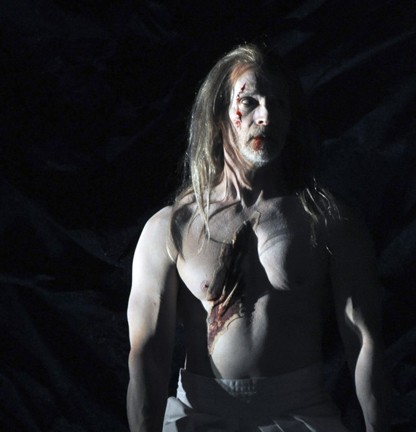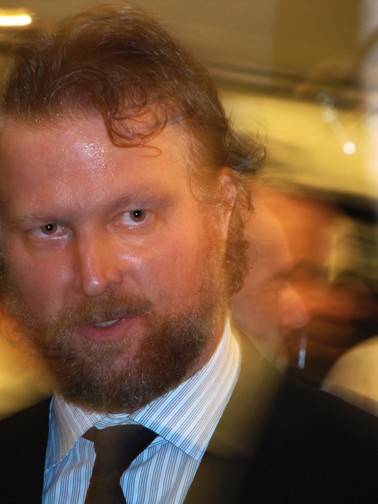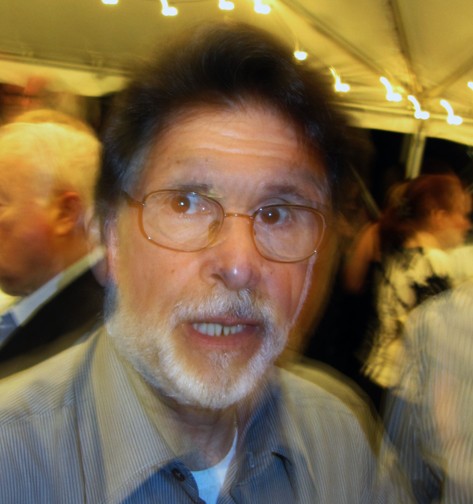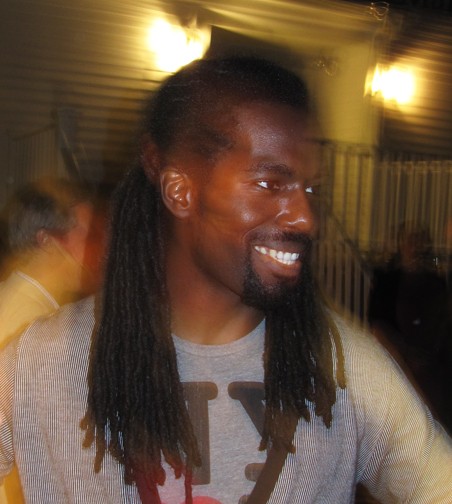Macbeth at Berkshire Theatre Festival
The Scottish Play at Warp Speed
By: Charles Giuliano - Aug 08, 2010
Macbeth
By William Shakespeare
Directed by Eric Hill
Scenic designer, Joseph Varga; Costumes, Olivera Gajic; Lighting, Dan Kotlowitz; Composer/ Sound, J. Hagenbuckle; Stage Manager, Jason Hindelang; Dramaturg, William Flesch; Movement artist, Isadora Wolfe.
Cast: Brandy Caldwell (Lady Macduff/ gentlewoman), Aaron Costa Ganis (Malcolm), Jesse Hinson (Bloody Captain/ 1st Murderer/ Seton), Walter Hudson (Banquo), Rob Mc Fadyen (Mentieth/ Lord), Tim McGeever (Macduff), Johnnie McQuarkey (Lennox), Equiano Mosiere (Witch #3/ Angus/ 3rd Murderer), Keira Naughton (Lady Macbeth), Ralph Petillo (Duncan/ 2nd murderer/ Doctor), Tommy Schrider )Witch #2/ Ross), Elizabeth Terry (Witch #1/ Porter), C.J. Wilson (Macbeth).
Berkshire Theatre Festival
Stockbridge, Mass.
August 4 to 14, 2010
"When shall we three meet again? In thunder, lightning, or in rain?"
The Scottish Play, as it is known in the theatre community, is the most medieval of the Bard’s works with its fixation on fate and the supra natural. Its focus on the paranormal, and fantastical three weird sisters, evokes some of the most spectacular moments in the drama. Compared to the proto existential, High Renaissance, Hamlet, and surreal, Mannerist, Tempest, this Gothic play is his most linear metaphysical creation.
From the first encounter of Macbeth and Banquo with the weird three we know their fates. Macbeth will be king but bear no royal issue. This will fall to Banquo who will sire a line of kings.
With this sorcery and prophesy the trajectory of the plot is fixed in place. What remains is for the often dense Macbeth to stumble and bumble his way to an ultimate demise. He is astonished when aspects of the prophesy quickly become true. In the opening of the second act he returns to learn more. Hearing that he will prevail as monarch, having slaughtered his way to the throne, until “Fear not, till Birnam wood. Do come to Dunsinane.” He will only be defeated by one to no woman born.
Hearing what he wants to believe Macbeth finds disarming and deceitful reassurance of his longevity as monarch. It seals his fate and is the tragic flaw of his unraveling.
As a simplistic Gothic tale there is no suspense in Macbeth. We know from first to last what will occur. Particularly those of us who read this play in high school and memorized lines as homework. It is perhaps the most familiar and widely know of his works. As well as the most simplistic and comprehensible.
Of the many versions of Macbeth on stage and screen for me the most intriguing is the 1957 Throne of Blood directed by Akira Kurosawa, with Toshirô Mifune, Isuzu Yamada, and Takashi Shimura. I enjoyed sharing it with humanities classes. The lesson was to take a work they thought they knew and reconfigure it as a Samurai movie.
With this production at Berkshire Theatre Festival the anticipation was what they would do with such a familiar drama. What would be the motivation? Why do Macbeth as a generalist company just down the road from the specialized Shakespeare & Company? One answer may well be why not? Nobody owns the Bard. It is interesting that three of the four major Berkshire theatre companies currently have productions of Shakespeare. S&Co has Richard III and Winter’s Tale alternating in its Founders Theatre. Williamstown Theatre Festival is kicking in with a rock deconstruction of Romeo and Juliet, a smash hit The Last Goodbye. In this Berkshire marathon of the Bard Barrington Stage is Taking the Fifth.
This sets up a nice, site specific, compare and contrast. How are these productions similar and how do they differ? By a lot is the answer. In general S&Co, plays it straight and by the book. BTF is taking a twist on its tale. While WTF is offering a gonzo, post modern, stand on its head, deconstruction.
The commonality of all of this diversification is that wonderful poetic language. Even through the din of the rock music of Jeff Buckley in The Last Goodbye one hears the familiar lines.
If you are following the thread of this summer long Shakespeare festival in all of its intense diversity then grab your baton and jump into this relay race. Pick up the pace in Stockbridge.
There is much to like about the BTF production. Start with the appropriately grim and grisaille abstracted, craggy set so brilliantly concocted by Joseph Varga. It is one of the most creative scenic designs of the season. Particularly compared to the bare pipes and props that are the norm at S&Co. Add to that the moody lighting of Dan Kotlowitz.
The theme of black, white and grey is further conveyed in the ersatz medieval costumes of Olivera Gajic. Instead of kilts, historically Macbeth is older than that style, the men wear long black skirts. With leather accents suggesting armor.
But then Gajic makes a terrible mistake by dumfoundingly dressing Lady Macbeth (Keira Naughton) in a strapless, red evening gown. In a setting so gray and devoid of color why opt to glaringly set her apart. You need sun glasses to look at her. It is the first of many details that are so hopelessly wrong about this Lady Macbeth.
In order to produce the Scottish Play one must start with a truly magnificent actor to portray Macbeth. Here C.J. Wilson passes the ordinary, is often true and compelling, but falls short of memorable. His Macbeth fades quickly.
If it takes a good Macbeth to stage this play arguably the role of Lady Macbeth is even more crucial. Here Naughton was less than ordinary or even decent. She was an utter disaster.
In the canon Lady Macbeth is one of the most compelling and challenging roles. Driven by ruthless and bloody ambition she will stop at nothing to fulfill the evil prophesy. She makes it happen when he equivocates. Clearly she has the stones in the family. A strong Lady Macbeth is nothing short of terrifying. With Naughton’s muddled and mediocre delivery the threat level hovered near zero.
It is essential to be horrified by her ruthless, murderous ambition the better to be moved by her coming apart as a consequence of the bloody deeds. Having never really been involved in cajoling and chastising, humiliating her husband into dire actions we simply fail to pity her deranged remorse in the famous scene. “Out, damned spot! out, I say! One; two: why, then, ’tis time to do ’t. Hell is murky! Fie, my lord, fie! a soldier, and afeard? What need we fear who knows it, when none can call our power to account? Yet who would have thought the old man to have had so much blood in him?”
While she scrubs her hands of the blood the scene, ironically, is a wash.
Not to say this production is without merit. There are wonderful moments and superb performances. There was the compelling scene when the witches conjure up shades with prophesies. In general the scenes with the witches were absorbing and suitably morbid. Many in the supporting roles were magnificent. The Banquo of Walter Hudson was masterful. Both in life, as the companion of Macbeth, and as a bloodied apparition. We much applaud the measured and rich Macduff of Tim NcGeever. Ralph Patillo was suitably commanding and regal as Duncan. He returned splendidly in the cameo role of the Doctor called in to treat the illness of Lady Macbeth. Brandy Caldwell evoked much compassion as the protective mother Lady Macduff who is raped and murdered by Macbeth’s thugs.
Through all this Wilson’s Macbeth lunges and lurches with varying degrees of conviction. I particularly enjoyed his reading of “Is this a dagger which I see before me, The handle toward my hand? Come, let me clutch thee. I have thee not, and yet I see thee still.”
With an understanding of the limits of a contemporary audience this production has been compressed to just over two hours. That is a merciful third less than the norm. But for some that tempo felt rushed. It seemed odd to have a Macbeth that flew by at warp speed. But with this production perhaps that was quite ok.

